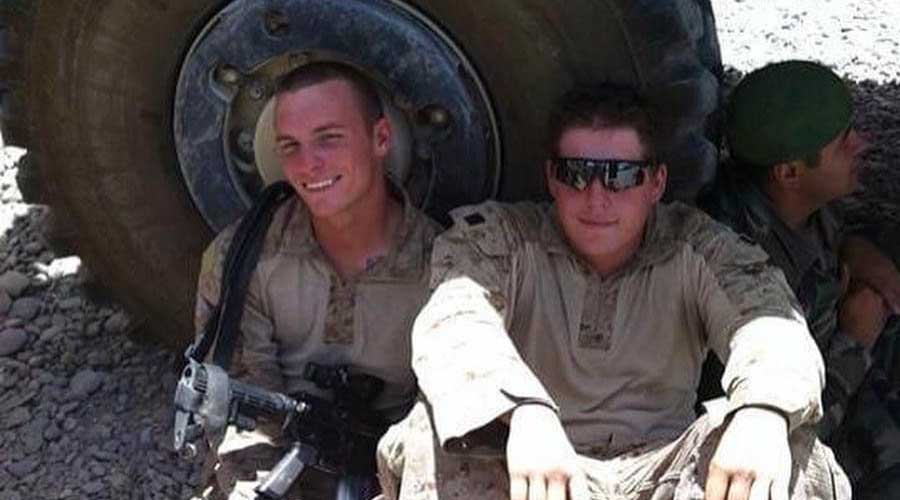 Justin Tankersley, left, during a military deployment. Photo courtesy of the Tankersley family.
Justin Tankersley, left, during a military deployment. Photo courtesy of the Tankersley family.Military Veteran Finds Thriving Career in Facilities Management
Justin Tankersley overcomes serious injury in Afghanistan to become facility leader.
By Dave Lubach, Executive Editor
Facility managers know how to expect the unexpected, like the HVAC system going down when air temperatures reach record highs, or bad weather knocking out power for days, forcing a school to close or a hospital to transfer patients.
The best facility managers are praised for their ability to adapt to the inevitable adversity that comes with the job. The trait to keep calm and carry on when trouble hits is what separates the best from the rest.
As a 2022 Facility Champion, Justin Tankersley has proven that he can both push a facility forward with his ideas for efficiency and also adjust plans when something goes wrong.
Tankersley was a member of the U.S. Marine Corps before starting his FM career. What the Lynchburg, Tennessee, native experienced during his time serving his country prepared him for whatever curveballs the FM profession would present.
Military background
Tankersley had options for his future growing up as the middle brother of three siblings. Tankersley’s father served in the Army for a few years before finishing up in the Marine Corps and “was a strict man who believed in strong disciplines,” he says.
Despite having scholarship offers to play football at small colleges, Tankersley inevitably felt the pull to follow in his father’s footsteps.
“My brothers and me had military foot lockers at the ends of our beds until we were in our teen years,” Tankersley says.
Tankersley joined the Marine Corps in 2008 and worked his way up to becoming a non-commissioned officer, becoming a machine gun section leader in the Marine Corps infantry. His duty was to train Marines about machine guns and how to implement machine guns into infantry rifle squads as they prepared for combat in Afghanistan.
Tankersley found his way to Afghanistan through two deployments. His first deployment was part of Operation Moshtarak, when 15,000 Marines fought with the Afghan soldiers to retake a major city during the Battle of Marjah. The operation was chronicled in an HBO documentary.
War changes soldiers in various ways, and for Tankersley a second deployment was certainly life changing. During a 2011 Taliban attack, Tankersley was hit by an improvised explosive device (IED). Following the attack, he was MEDVAC’d out of the country to Germany, where he was diagnosed with a brain injury.
Tankersley spent a few weeks under supervision before he was sent to Hawaii as part of the Wounded Warrior Battalion for six months. While recovering, he realized an alarming effect of the injury.
“My brain injury reared its face in the form of reading and writing,” he says. “I found that I was unable to connect thoughts to paper and vice versa. When I was reading, I could read the words with no issues, but I couldn’t understand what I read.”
The condition required six months of recovery time and work with a speech cognitive therapist. The injury still affects him from a concentration standpoint, but Tankersley says he has “recovered about 99 percent from this issue.”
Civilian life
According to the National Center for PTSD, 7 out of every 100 veterans will suffer from post-traumatic stress disorder. In many instances, troubles associated with PTSD often lead to life-long problems and unfortunately in too many cases, suicides.
Even soldiers who don’t suffer from PTSD and leave the military are commonly known to struggle when adapting to civilian life. Many veterans struggle to adapt to such common events as reconnecting with family and friends, finding jobs or careers, continuing education or trying to access services such as healthcare.
Tankersley experienced some of these characteristics upon leaving the military.
“I struggled to find a job, as every job I found seemed to have little meaning compared to leading the greatest warriors the U.S. has to offer,” he says. “I eventually moved to Washington state and became a general contractor building commercial and residential facilities.”
He lasted two years in that position until he moved to a different facilities position as facilities specialist for a Washington credit union. It was at this stop where an FM career came into focus.
“After showing that I had the diverse skill set to work in this type of industry, the director of facilities took me under his wing and introduced me to the facilities management world,” Tankersley says. “He explained and showed me how big the industry is, how the sky is the limit when it came to climbing the corporate ladder.”
Thanks to the director of facilities who also served as his mentor, Tankersley found a passion for the profession. Since entering the industry nine years ago, Tankersley has joined the International Facilities Management Association, obtained FMP and SFP designations, while achieving Six Sigma Green Belt status.
Military benefits FMs
Facilities departments all over the country are facing a staffing crisis, as retirements and a lack of younger replacements has managers struggling to fill their staffs with qualified workers.
One area of society that managers are turning to more and more to fill positions are military veterans. Tankersley is proof of the kinds of intangibles veterans possess to be successful in the FM world.
“The U.S. Marine Corps prides itself on creating warriors that uphold the highest standards, and this translated very well to a career in FM,” Tankersley says. “The Marines teach discipline, perseverance and strategic planning. All these traits I have found to be most useful in facilities management, as we are often responsible for large scale projects from construction to energy management, cost savings, etc. In addition, because of the nature of our work, reactive and proactive planning, we have to be able to execute swiftly under pressure.”
Tankersley’s current position as an associate director of facilities for a global digital business company has him overseeing facilities, administration and security in 18 locations across the U.S. and Mexico. He manages the disciplines in those facilities with a staff of eight people who manage audits, maintenance, construction, administration, transportation, first responders and data center environmental management.
“While I manage the team and all activities, most of my time and efforts are geared towards large scale projects and the digitalization of our departments across all geographies,” he says. “Utilizing Microsoft products, we have created automation and tracking tools to support all sections of our industry to include maintenance schedules, asset management, visitor management, data center management, work orders and employee portals for our staff to be up to date with everything happening around facilities. I could speak all day about the digital practices we’ve created over the last two years.”
Tankersley has goals of one day climbing to the level of a vice president level for facilities or starting his own facilities company that serves businesses. When many veterans struggle to find career satisfaction after their military time, Tankersley sounds like a veteran who has found a soft-landing space in civilian life.
“I am most satisfied when we are tasked with projects that seem impossible, short deadlines, etc.,” he says. “When we are able to successfully complete these projects, it truly shows the abilities and multitude of skills that facilities management brings to the table. There has always been a stigma that most think of us as the ‘maintenance guy’ or janitor. We are so much more than that and being able to showcase what true facilities management is always brings a sense of pride to me.”
Dave Lubach is the executive editor for the facilities market. He has more than eight years of experience covering facility management and maintenance.
Related Topics:












